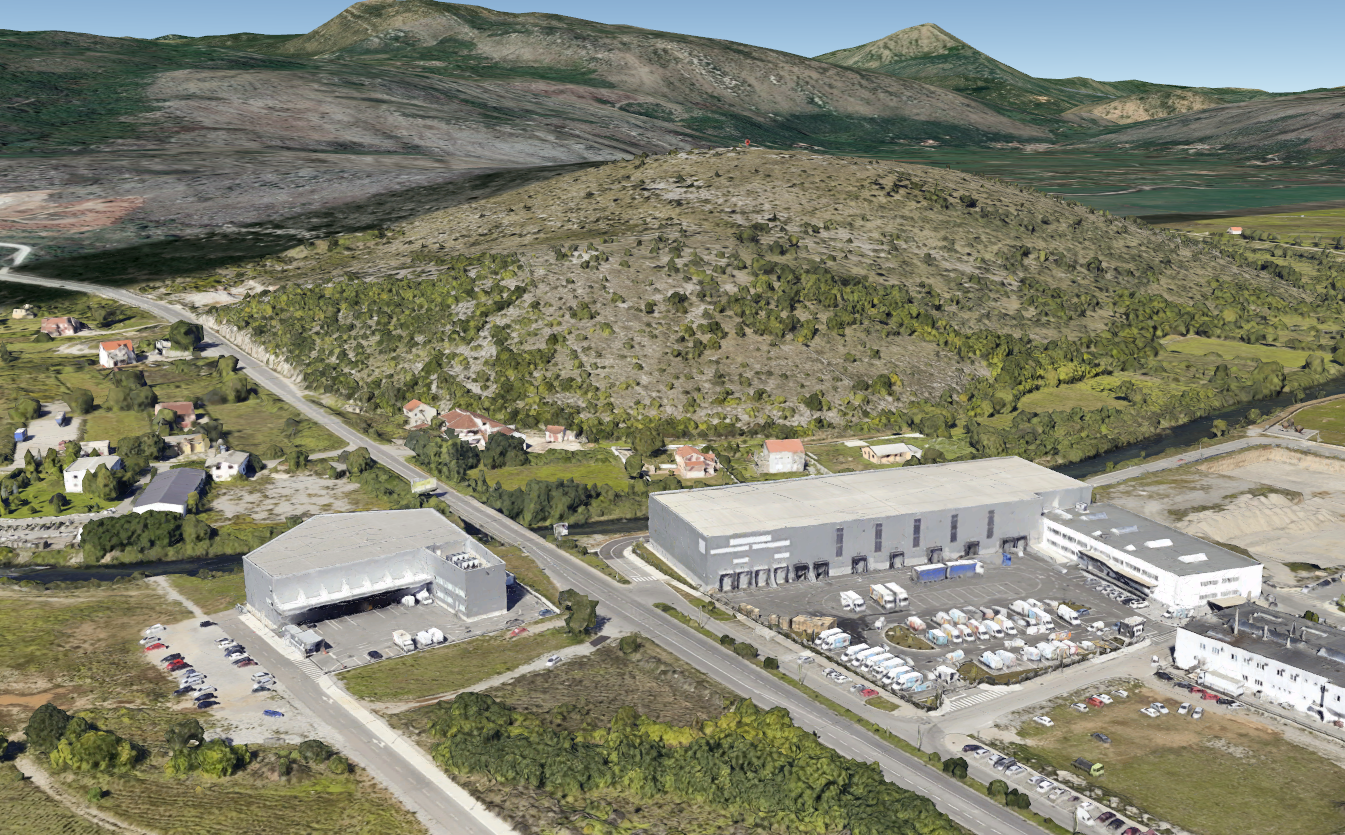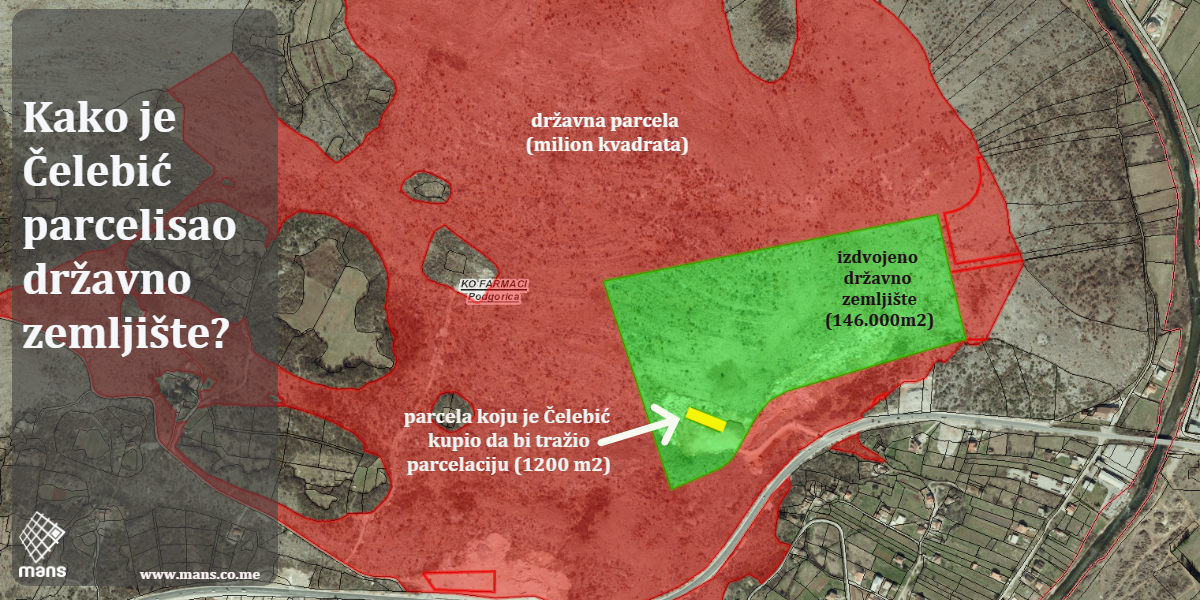In mid-2018, Čelebić officially registered in its name over 165,000 square meters of state-owned construction land in Donja Gorica, by which it finally implemented the plan to enable the company to acquire valuable assets without announcing a public tender, according to the documentation obtained by MANS Investigative Centre.
Čelebić company, the Real Estate Directorate and the national land registry circumvented the legal obligation to sell state property on the tender, the same way the former mayor of Podgorica, Miomir Mugoša, did in the case of “Carine”, who is now being tried before the Montenegrin courts due to a millions worth of damage caused to the state budget.

Mihinja Hill
Construction plots that were sold without a tender to Čelebić company are located on the Mihinja hill, at the very exit from Podgorica towards Cetinje, and according to the planning document, the construction of an exclusive settlement with over 400 apartments for the market is envisaged there.
The only way to sell state property to a private company without a public tender is the so-called system of “completion of urban parcels”, by which the owner who already owns land within the urban plot can request to buy out parts belonging to the state in order to complete the ownership and build on that land.
Although it owned only a small part of the construction land on the Mihinja hill, Čelebić company was enabled to acquire over 165,000 square meters of state-owned construction land on the basis of that ownership.
IN WHAT WAY WAS THE STATE PROPERTY WAS DIVIDED
According to MANS, Tomislav Čelebić, the owner of Čelebić company and the close business partner of the current president of the state, Milo Đukanović, started to implement his plan at the end of 2013 when he bought a plot of 1200 m2 on the Mihinja hill from the locals, which bordered with the much larger state-owned plot.
By the middle of the following year, Čelebić asked the Real Estate Directorate to allocate two parcels of land of approximately 146 thousand and 10 thousand m2 from the state land of over one million square meters. After the land registry approved it, the planning document showed that the land of Čelebić company and the state land now consisted of two urban plots in which the state had a dominant share.

In what way Čelebić divided the state land? State plot (million m2), Allocated state land (146,000 m2), Plot bought by Čelebić in order to request division (1200 m2)
In order to complete his plan for the construction of an exclusive residential area, Čelebić needed a third urban plot. Already at the beginning of 2015, the company from Podgorica submitted a new request to the land registry and requested for another land plot with 11 thousand m2 to be allocated from the remaining part of the state land at that location. The Real Estate Directorate approved it, and the third urban plot was formed, in which the state had a share of 11 thousand, and the locals around nine thousand square meters.
The following year, Čelebić bought this land as well from the locals in order to be able to request the purchase of the state part within the urban plot, without announcing the tender.
After enabling the state to divide its plots in the way that suited them, at the beginning of 2017, Čelebić company sent a letter to the Real Estate Directorate stating that it was interested in building facilities on the Mihinja hill. It was also proposed that the purchase of the state land be made through a public tender or through the mentioned completion of urban parcels.
Although at that moment Čelebić had only a small share of the land in the mentioned location, the Real Estate Directorate decided to sell the state plots without a public tender. The value of state land was estimated at close to one million Euros, with which Čelebić agreed.
Instead of paying this amount with money, Čelebić offered to the Real Estate Directorate a real estate exchange and paying of an extra charge, which was accepted.
IN WHAT WAY THE STATE PROPERTY WAS PAID
While Čelebić worked on dividing of the state land to ensure that he could buy it without a public tender, the Property Directorate was looking for business premises where the State Archive of Montenegro would be located. A tender for the lease of business premises was announced in mid-2016 and lasted less than a month in a shortened procedure.
“Čelebić” building next to the Basic Court in Podgorica
The management asked for a business space of 650 m2, and the only offer was delivered jointly by the companies “Čelebič” and “Veletex”, which owned business premises with the space approximate to the required in the Čelebić building next to the Basic Court in Podgorica. The company “Veletex” is owned by a senior official of the Democratic Party of Socialists (DPS), Vlastimir Golubović.
The Real Estate Directorate accepted this offer and in May 2016, it concluded a lease agreement for a year, which was later extended for another year.
As early as in the beginning of following year, Čelebić suggested to exchange these business premises with the state in order to pay for the state land in Mihinja.
“During the preparation of the proposal for the exchange of real estate, the Real Estate Directorate wanted to reduce the rent costs for the needs of the State Archive, which at that moment amounted to 94,104,000 (without VAT) on an annual basis,” said the Director of the Real Estate Directorate, Blažo Šaranović, in a statement given earlier to the MANS Investigative Center.
The land in Mihinja was estimated at close to one million Euros, and business premises at around €840 thousand, while Čelebić agreed to pay a difference of around €150 thousand to the state budget.
In February last year, the Government of Montenegro gave its consent to this work and instructed the Real Estate Directorate to complete an agreement on the exchange of real estate with Čelebić.
Although MANS Investigative Centre has contacted them several times on this case, Čelebić company gave no comment until the publication of this article.
Complete documentation on this case.
Lazar Grdinić
MANS Investigative Centre
Kovačević estimated the state land below market value
In 2017, the Commission of the Real Estate Directorate, consisting of, in addition to Zoran Senić, Dragan Kovačević and Slavko Simović, the heads of the state land registry whose work was previously disputed, assessed that a square meter of the land in three state parcels was worth between five and eight Euros. The market value assessment method they used meant comparing the value of the land with the current offer in the real estate market.
By analyzing the offer on the market, the commission came to the conclusion that the value of similar land is around 40 Euros per square meter. After that, the value of the state plots, according to estimation of Kovačević, was reduced from 40 Euros to a range of five to eight Euros per square.
Dragan Kovačević, Director of the Real Estate Directorate
Kovačević and his commission for assessment listed as the reason for the reduction of the price at which the state plots would be sold to Čelebić that the land did not have a direct connection with the Podgorica-Cetinje highway, that it was not equipped with utilities, that water and electricity connections were located at a distance of 700 meters. Such a drastic reduction in the value of land would be applicable in the case of a site that was not urbanized or where no construction was foreseen.
Planning document that covers the construction site implies the obligation of the Capital City to provide utility equipment, including access roads and connections to water and electricity, which is a basic prerequisite for land to be considered as construction land.
How contradictory is the assessment made by Kovačević, also shows an example in which the value of the land is being reduced because the plots do not have access to the main road, while the second part states that the plots have “excellent traffic connection”.
When asked by the MANS Investigative Centre why they used data on land that are not comparable either by location or by price, the commission members answered that the assessment was professional, impartial and objective. They also added that “it is difficult to imagine such ideal situation where physical, planning and other features of a subject of the assessment and its price equivalent coincide with comparative real estate, and, hence, the evaluation standards themselves point to the use of the most similar comparable real estate available at the time of the preparation of the report on the assessment.”
Completing of plots is a harm to the public interest
The practice according to which the described process of completion of urban plots is done has previously caused scandals in the professional and non-professional public. The most famous case of this type is “Carine”, for which the former mayor of Podgorica Miomir Mugoša is charged with abuse of his official position, as well as the case of a newly built high-rise building near the Hotel “Podgorica”.
Both examples showed that the estimated value of the urban land was much lower than the market value, and that the practice in which the owner of a smaller part of the urban plot purchases a larger part of the state land without a public tender, is a harm to the public interest.



